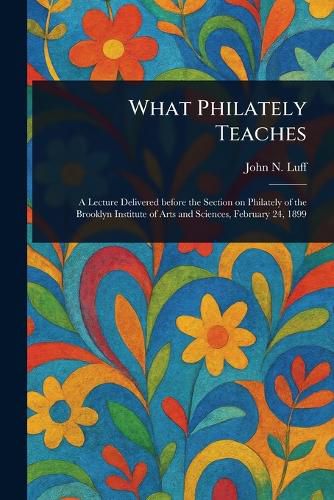Readings Newsletter
Become a Readings Member to make your shopping experience even easier.
Sign in or sign up for free!
You’re not far away from qualifying for FREE standard shipping within Australia
You’ve qualified for FREE standard shipping within Australia
The cart is loading…






This title is printed to order. This book may have been self-published. If so, we cannot guarantee the quality of the content. In the main most books will have gone through the editing process however some may not. We therefore suggest that you be aware of this before ordering this book. If in doubt check either the author or publisher’s details as we are unable to accept any returns unless they are faulty. Please contact us if you have any questions.
Explore the captivating world of stamp collecting with "What Philately Teaches" by John N. Luff. This meticulously prepared republication of a 19th-century lecture offers a fascinating glimpse into the early days of philately. Originally delivered before the Section on Philately of the Brooklyn Institute of Arts and Sciences in 1899, this text provides insights into the educational and historical value of postage stamps.
Discover the enduring appeal of stamp collecting as Luff explores the subject, sharing his knowledge and passion. Perfect for both seasoned philatelists and those curious about the hobby, this book provides a unique historical perspective on the art and science of collecting. Delve into the world of 19th-century philately and uncover the hidden stories behind these miniature pieces of history. A must-have for anyone interested in antiques & collectibles, particularly stamps, and those with a passion for 19th-century United States history.
This work has been selected by scholars as being culturally important, and is part of the knowledge base of civilization as we know it.
This work is in the public domain in the United States of America, and possibly other nations. Within the United States, you may freely copy and distribute this work, as no entity (individual or corporate) has a copyright on the body of the work.
Scholars believe, and we concur, that this work is important enough to be preserved, reproduced, and made generally available to the public. We appreciate your support of the preservation process, and thank you for being an important part of keeping this knowledge alive and relevant.
$9.00 standard shipping within Australia
FREE standard shipping within Australia for orders over $100.00
Express & International shipping calculated at checkout
This title is printed to order. This book may have been self-published. If so, we cannot guarantee the quality of the content. In the main most books will have gone through the editing process however some may not. We therefore suggest that you be aware of this before ordering this book. If in doubt check either the author or publisher’s details as we are unable to accept any returns unless they are faulty. Please contact us if you have any questions.
Explore the captivating world of stamp collecting with "What Philately Teaches" by John N. Luff. This meticulously prepared republication of a 19th-century lecture offers a fascinating glimpse into the early days of philately. Originally delivered before the Section on Philately of the Brooklyn Institute of Arts and Sciences in 1899, this text provides insights into the educational and historical value of postage stamps.
Discover the enduring appeal of stamp collecting as Luff explores the subject, sharing his knowledge and passion. Perfect for both seasoned philatelists and those curious about the hobby, this book provides a unique historical perspective on the art and science of collecting. Delve into the world of 19th-century philately and uncover the hidden stories behind these miniature pieces of history. A must-have for anyone interested in antiques & collectibles, particularly stamps, and those with a passion for 19th-century United States history.
This work has been selected by scholars as being culturally important, and is part of the knowledge base of civilization as we know it.
This work is in the public domain in the United States of America, and possibly other nations. Within the United States, you may freely copy and distribute this work, as no entity (individual or corporate) has a copyright on the body of the work.
Scholars believe, and we concur, that this work is important enough to be preserved, reproduced, and made generally available to the public. We appreciate your support of the preservation process, and thank you for being an important part of keeping this knowledge alive and relevant.